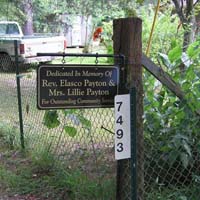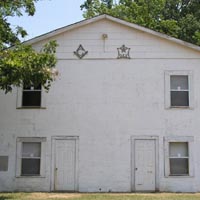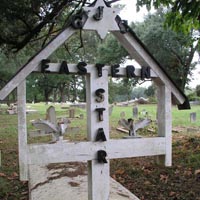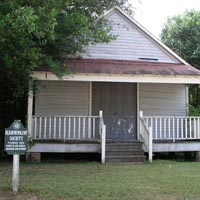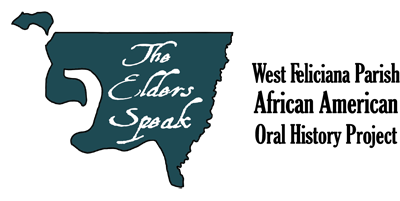
The Elders Speak: The West Feliciana Parish African American Oral History Project
By Teresa Parker Farris

Segregation & Civil Rights
The interviewees had vivid memories of the Jim Crow era when water fountains, doctors' offices, restaurants, and St. Francisville's one movie theatre were segregated by race. As in other areas of the South, blacks in West Feliciana had inferior housing, low-paying jobs, and no right to vote. With the 1960s Civil Rights Movement, however, African Americans began openly to resist such inequities. Central to their efforts was the voter registration movement, which in West Feliciana Parish was based out of the Masonic Lodge on U.S. Highway 61 and organized by CORE activists Ronnie Moore and Miriam "Mimi" Feingold (now Miriam Real).
A key event during the period was the arrest and brief incarceration of local black minister Reverend Joseph Carter following his attempt to register to vote on August 10, 1963. Two months later he found success, thus galvanizing the African American community and marking a turning point in the parish's civil rights movement. Famed photographer Bob Adelman documented these events for a 1964 article appearing in Ebony magazine. Additional images may be found in Adelman's online archive at www.bobaadelman.net; photographs specific to West Feliciana Parish begin with the identifier CoreLA_WF.
Audio PlayerGeorge Norflin remembers going daily to the parish courthouse, hoping to get the right to vote and reflects on the movement's significance for elders in the community.
Audio PlayerGeorge Norflin recalls the speeches that activist Mimi Feingold gave in the local churches.
Audio PlayerAlice Johnson describes entering businesses through the back door and going to St. Francisville's segregated movie house.
Audio PlayerTravis Carter recalls the arrest of Rev. Joseph Carter, his own failed attempts to register, and attending voter registration meetings in Laurel Hill.
Audio PlayerGeraldine London describes the inadequate, substandard houses in which most of the parish's African Americans lived.
Audio PlayerRobert Sterling explains the frustrations and hardships associated with the voter registration tests.
Audio PlayerTurlie Richardson states that today whites give African Americans greater respect.
Audio PlayerEllen Hardy remembers attending voter registration meetings and waiting in front of the Grace Episcopal Church cemetery in order to take the test.
Audio PlayerElizabeth Lee thinks back to secretly providing food for local activists.
Audio PlayerRosia Pate describes the poor condition of most African American housing and being unable to buy land owned by whites.

Payton Place
African American landowner Elasco Payton established the small neighborhood of 10 to 12 houses amid the Civil Rights Movement. Aware that white landlords had threatened black tenants with eviction should they register to vote, he offered plots of land to those who were forced or chose to relocate. A modest sign honoring Payton was erected by his daughter in the spring of 2004.
Payton Place is located at the corner of Solitude Road and Delray Lane (take Solitude Road and veer left at "t" and sign will be on the right).
Masonic Lodge (J.S. McGehee Lodge #54)
Built in 1955, the structure replaced the lodge's original meeting place in the Laurel Hill School. During the fall of 1963, the building housed weekly voter registration clinics organized by local activists and members of CORE (Congress of Racial Equality). It was from this building, on October 17, that local ministers Reverends Carter and Davis—along with nearly 40 others—made their historic trip to St. Francisville to register to vote. After waiting for approximately six hours, Reverend Carter took and passed the voter eligibility test, becoming the first African American to register since 1902. The symbols on the building's facade represent, on the right, the Freemasonry fraternal organization and, on the right, the Order of the Eastern Star, the oldest sorority-based black women's organization in America.
The lodge is located at 13152 U.S. Highway 61 (on the right, 8.0 miles north of U.S. Highway 61 and LA Highway 66 intersection).
Old Benevolent Society
Founded in 1883, the Old Benevolent Society is the oldest black burial insurance lodge in West Feliciana Parish. Such African American associations allowed members to pool their meager resources to pay for each others' medical and funeral expenses. While benevolent societies existed in the Upper South and Mid-Atlantic as early as the Revolutionary War era, it was not until the end of the Civil War that they took hold in the Deep South. Benevolent societies proved foundational to the newly freed population, providing care, facilitating fellowship, and promoting racial solidarity.
The Old Benevolent Society Building is located on Ferdinand Street (across from the West Feliciana Historical Society).



